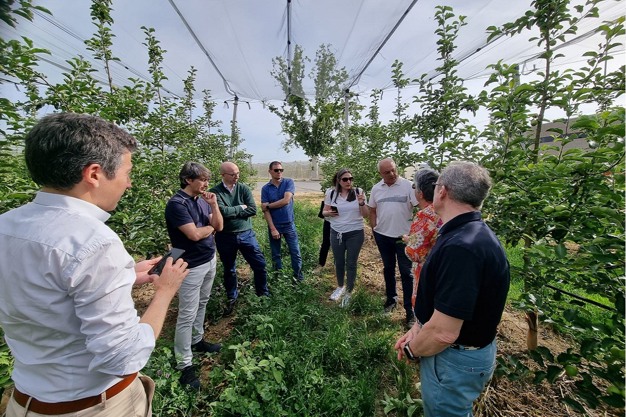On June 6th and 7th, the top fruit contact group met in Lerida, Spain. Hosted by AFRUCAT (Catalonia Association of Fruit Companies), unions and associations of producers' organizations, as well as administrations from Spain (ASAJA), Portugal, Italy (ASSOMELA) and France met to take stock of the situation in the sector and try to find solutions to common problems. Pierre Venteau, director of the French Apple Pear Association (ANPP) reports on the event.

Common concerns, but "greater pressure in France"
In all four countries, "the concerns are exactly the same, especially regarding the means of production": access to water to cope with climatic hazards (irrigation, frost protection), the gradual disappearance of active ingredients and generational renewal, which is the consequence of a lack of visibility and uncertain remuneration for professionals of the sector. "Without a solution, the European top fruit sector could disappear," warn the organizations. In France, however, the issue of plant protection products is particularly agitating, due to an overkill of standards and bans. "Pressure in France is greater than in the other 3 countries. Italy was already sensitive to this, and we also have the feeling that our Spanish and Portuguese colleagues have become aware of the impasse we are currently in," explains Pierre Venteau, director of ANPP.
Priority to active ingredients
For the moment, priority is given to active ingredients. The work of the contact group will therefore first focus on: the principle of automatic mutual recognition, so that a product used in one European country can automatically be authorized under the same conditions in another producer country in the same zone, and the EFSA (European Food Safety Authority) assessment procedure in the event of the withdrawal of an active ingredient, so that an economic impact study for each sector is also carried out before any withdrawal, since currently the agency only assesses the health and environmental dimensions.
Next steps?
"The principles have now been validated with the contact group, so we need to formulate our concrete requests for these two avenues and then refer the matter to our respective national administrations so that our public authorities can take the matter to the European level," explains Pierre Venteau, who also hopes that "the new MEPs will agree with our requests."
For more information:
Association Nationale Pommes Poires
7 rue Biscornet - 75012 Paris
Phone: +33 (0) 1 53 10 27 80
Fax: +33 (0)1 53 10 27 88
[email protected]
[email protected]
www.lapomme.org
